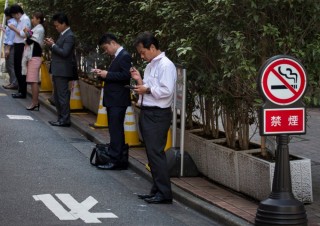Loading
Search
▼ Japanese University Says It Won’t Hire Teachers Who Smoke
- Category:Other
A university in Japan says it has stopped hiring faculty members who smoke unless they promise to quit, a once-unthinkable decision in a country that has just recently cracked down on its heavy-smoking ways.
Nagasaki University said the policy, announced last week, was part of its larger antismoking push. Last year, the university announced it would ban smoking on campus starting in August, and said it planned to ban the possession of items related to smoking starting in April 2020.
“Our job as a university is to nurture human resources, and we feel obliged to discourage people against smoking as some companies have begun not recruiting smokers,” Shigeru Kono, president of the university, said last week, according to The Asahi Shimbun.
A university spokesman, Yusuke Takakura, said the university was confident the policy would not run afoul of discrimination laws. “We have reached a conclusion that smokers are not fit for the education sector,” Mr. Takakura said in an interview with Agence France-Presse.
Nagasaki is not alone in its efforts. On Tuesday, Seigo Kitano, the president of Oita University, said the university had “put priority on nonsmokers” in hiring. Of 161 faculty members hired this spring, only three were smokers, he said.
Such steps would have long been considered unlikely in Japan, which for decades was considered a friendly place for smokers with few restrictive laws or public health efforts.
But the national smoking rate hit a low in 2018, according to Japan Tobacco, a multinational tobacco giant partially owned by the government. At its peak in 1966, 49 percent of the adult population smoked, including 84 percent of men. But last year just 18 percent of adults smoked, including 28 percent of men.
Those numbers are still high by international standards, which has concerned many as Tokyo prepares to host the 2020 Olympics. The International Olympic Committee requires a smoke-free environment for the Games, and the city has complied with a smoking ban at indoor and outdoor Olympic venues.
Tokyo has also passed a smoking ban at bars and restaurants, set to take effect a few months before the Olympics begin. Last year, the government passed a nationwide smoking ban in public places, but fierce resistance from the restaurant industry led to 55 percent of eating establishments being exempted.
Smoking remains part of the work culture in Japan, where many offices have designated indoor smoking rooms for midday breaks, but some companies have made their own antismoking efforts. One company offered extra days off to employees who didn’t smoke, leading a few to give up the habit.
Nagasaki University said the policy, announced last week, was part of its larger antismoking push. Last year, the university announced it would ban smoking on campus starting in August, and said it planned to ban the possession of items related to smoking starting in April 2020.
“Our job as a university is to nurture human resources, and we feel obliged to discourage people against smoking as some companies have begun not recruiting smokers,” Shigeru Kono, president of the university, said last week, according to The Asahi Shimbun.
A university spokesman, Yusuke Takakura, said the university was confident the policy would not run afoul of discrimination laws. “We have reached a conclusion that smokers are not fit for the education sector,” Mr. Takakura said in an interview with Agence France-Presse.
Nagasaki is not alone in its efforts. On Tuesday, Seigo Kitano, the president of Oita University, said the university had “put priority on nonsmokers” in hiring. Of 161 faculty members hired this spring, only three were smokers, he said.
Such steps would have long been considered unlikely in Japan, which for decades was considered a friendly place for smokers with few restrictive laws or public health efforts.
But the national smoking rate hit a low in 2018, according to Japan Tobacco, a multinational tobacco giant partially owned by the government. At its peak in 1966, 49 percent of the adult population smoked, including 84 percent of men. But last year just 18 percent of adults smoked, including 28 percent of men.
Those numbers are still high by international standards, which has concerned many as Tokyo prepares to host the 2020 Olympics. The International Olympic Committee requires a smoke-free environment for the Games, and the city has complied with a smoking ban at indoor and outdoor Olympic venues.
Tokyo has also passed a smoking ban at bars and restaurants, set to take effect a few months before the Olympics begin. Last year, the government passed a nationwide smoking ban in public places, but fierce resistance from the restaurant industry led to 55 percent of eating establishments being exempted.
Smoking remains part of the work culture in Japan, where many offices have designated indoor smoking rooms for midday breaks, but some companies have made their own antismoking efforts. One company offered extra days off to employees who didn’t smoke, leading a few to give up the habit.
- April 26, 2019
- Comment (0)
- Trackback(0)


